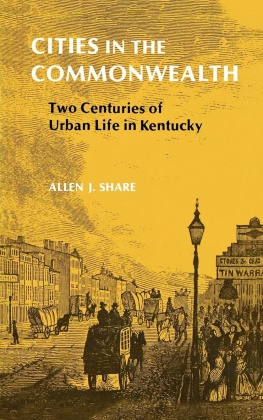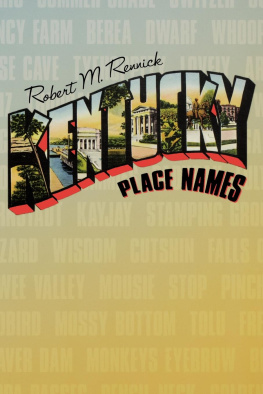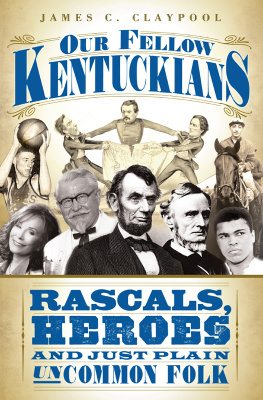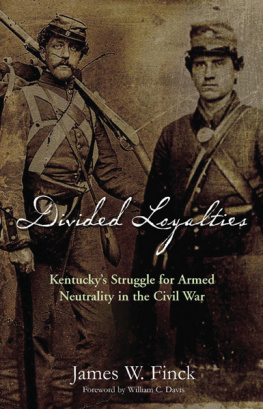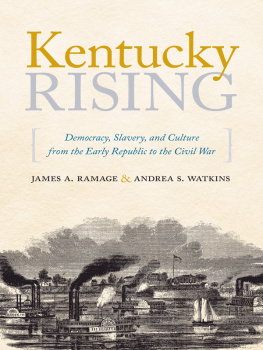The Kentucky Bicentennial Bookshelf
Sponsored by
KENTUCKY HISTORICAL EVENTS CELEBRATION COMMISSION
KENTUCKY FEDERATION OF WOMENS CLUBS
and Contributing Sponsors
AMERICAN FEDERAL SAVINGS & LOAN ASSOCIATION
ARMCO STEEL CORPORATION, ASHLAND WORKS
A. ARNOLD & SON TRANSFER & STORAGE CO., INC. / ASHLAND OIL, INC.
BAILEY MINING COMPANY, BYPRO, KENTUCKY / BEGLEY DRUG COMPANY
J. WINSTON COLEMAN, JR. / CONVENIENT INDUSTRIES OF AMERICA, INC.
IN MEMORY OF MR. AND MRS. J. SHERMAN COOPER BY THEIR CHILDREN
CORNING GLASS WORKS FOUNDATION / MRS. CLORA CORRELL
THE COURIER-JOURNAL AND THE LOUISVILLE TIMES
COVINGTON TRUST & BANKING COMPANY
MR. AND MRS. GEORGE P. CROUNSE / GEORGE E. EVANS, JR.
FARMERS BANK & CAPITAL TRUST COMPANY / FISHER-PRICE TOYS, MURRAY
MARY PAULINE FOX, M.D., IN HONOR OF CHLOE GIFFORD
MARY A. HALL, M.D., IN HONOR OF PAT LEE,
JANICE HALL & MARY ANN FAULKNER
OSCAR HORNSBY INC. / OFFICE PRODUCTS DIVISION IBM CORPORATION
JERRYS RESTAURANTS / ROBERT B. JEWELL
LEE S. JONES / KENTUCKIANA GIRL SCOUT COUNCIL
KENTUCKY BANKERS ASSOCIATION / KENTUCKY COAL ASSOCIATION, INC.
THE KENTUCKY JOCKEY CLUB, INC. / THE LEXINGTON WOMANS CLUB
LINCOLN INCOME LIFE INSURANCE COMPANY
LORILLARD A DIVISION OF LOEWS THEATRES, INC.
METROPOLITAN WOMANS CLUB OF LEXINGTON / BETTY HAGGIN MOLLOY
MUTUAL FEDERAL SAVINGS & LOAN ASSOCIATION
NATIONAL INDUSTRIES, INC. / RAND MCNALLY & COMPANY
PHILIP MORRIS, INCORPORATED / MRS. VICTOR SAMS
SHELL OIL COMPANY, LOUISVILLE
SOUTH CENTRAL BELL TELEPHONE COMPANY
SOUTHERN BELLE DAIRY CO. INC.
STANDARD OIL COMPANY (KENTUCKY)
STANDARD PRINTING CO., H. M. KESSLER, PRESIDENT
STATE BANK & TRUST COMPANY, RICHMOND
THOMAS INDUSTRIES INC. / TIP TOP COAL CO., INC.
MARY L. WISS, M.D. / YOUNGER WOMANS CLUB OF ST. MATTHEWS
Research for The Kentucky Bicentennial Bookshelf is assisted by a grant from the National Endowment for the Humanities. Views expressed in the Bookshelf do not necessarily represent those of the Endowment.
Copyright 1976 by The University Press of Kentucky
Paperback edition 2009
The University Press of Kentucky
Scholarly publisher for the Commonwealth, serving Bellarmine University, Berea College, Centre College of Kentucky, Eastern Kentucky University, The Filson Historical Society, Georgetown College, Kentucky Historical Society, Kentucky State University, Morehead State University, Murray State University, Northern Kentucky University, Transylvania University, University of Kentucky, University of Louisville, and Western Kentucky University.
All rights reserved.
Editorial and Sales Offices: The University Press of Kentucky
663 South Limestone Street, Lexington, Kentucky 40508-4008
www.kentuckypress.com
Cataloging-in-Publication Data is available from the Library of Congress.
ISBN 978-0-8131-9313-7 (pbk: acid-free paper)
This book is printed on acid-free recycled paper meeting the requirements of the American National Standard for Permanence in Paper for Printed Library Materials.
Manufactured in the United States of America.
| Member of the Association of American University Presses |
Acknowledgments
FEW BOOKS, IF ANY, are entirely the product of a single individuals efforts. Certainly this one is not. The assistance, encouragement, and criticism of several people were essential to the research upon which this book is based. My principal debt is to Professor Holman Hamilton, who spent many hours guiding and directing my research on the War of 1812. I am also grateful to Professors Carl B. Cone and James F. Hopkins, whose suggestions and knowledgeable comments influenced a number of my conclusions about Kentuckys role in the War of 1812.
For their aid in locating sources and furnishing guidance in the use of facilities I am indebted to librarians at many institutions. Because I applied to them more frequently for assistance, my debt is particularly great to the staffs of the University of Kentuckys Margaret I. King Library, the Kentucky Historical Society, and the Murray State University library. Many of the materials I found most useful were located at The Filson Club in Louisville, Kentucky, and for that reason I am especially appreciative of the generous assistance provided there and for permission from The Filson Club to use and quote from its archival collections.
Finally I must acknowledge that without the encouragement of my wife Charlotte, who endured many impositions and generously assumed a disproportionate share of family responsibilities for a long time, the writing of this book could not have taken place.
Introduction
THE WAR OF 1812 had its origins in Anglo-American controversies over neutral rights during a period when the worlds greatest powers, Great Britain and France, were locked in mortal combat. But for the post-Revolutionary War generation of young Kentuckians, the War of 1812 seemed as much a war for American independence as was the Revolution itself. Upon learning, in June 1812, that the United States had declared war against Great Britain, the Lexington Reporter proclaimed: The dreadful, deadly chord [sic] which anchored us along side of death and destruction is once more cut, and we are again afloat on the sea of liberty. Echoing that sentiment in their official pronouncement of support for the war, members of the Kentucky General Assembly resolved that the British governments pertinacious adherence to Claims which no Nation ought to submit to had left the United States no option but armed resistance.
That Kentuckians were prepared to offer far more in support of the American war effort than paper resolutions and wordy editorials was immediately evident. So great was the rush to the colors by eager volunteers following the declaration of war that many were turned away for lack of arms and powder with which to equip them. Few who sought service against the British and their Indian allies would be disappointed for long, however. Before the conflict ended in early 1815, an astonishingly high percentage of eligible Kentucky males were enrolled for varying periods of military service either as regulars, volunteers, or militia.
Nor were those Kentuckians who donned the uniform of their state or nation merely parade-ground soldiers. Thomas Jeffersons prediction that the conquest of Canada would be simply a matter of marching, and Henry Clays assurances that the Kentucky militia alone would suffice to capture Quebec, proved equally fatuous. From the outset, Kentuckys citizen-soldiers found themselves involved in some of the heaviest fighting of the war. The fortitude with which they bore both defeat and victory soon established for the state an enduring reputation for patriotic ardor and military valor in the national interest. Within a year of the outbreak of war in 1812, Kentuckys unstinting exertions were being pointed to by eastern politicians and journalists as an example for the remainder of the Union to emulate.


